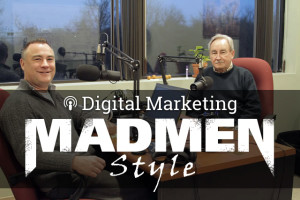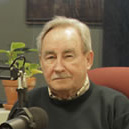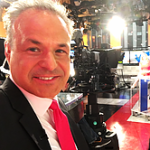
 John McDougall: Hi, I am John McDougall. Welcome to the Authority Marketing Roadmap. Today, I’m here with my father Dan McDougall, founder of McDougall Associates and McDougall Fine Arts. We’re going to be talking about sales and marketing madmen style. Welcome, Dan.
John McDougall: Hi, I am John McDougall. Welcome to the Authority Marketing Roadmap. Today, I’m here with my father Dan McDougall, founder of McDougall Associates and McDougall Fine Arts. We’re going to be talking about sales and marketing madmen style. Welcome, Dan.
 Dan McDougall: Well, I’m glad to be here John. Also, I’m very excited about your business and where you’ve taken the digital marketing company. Starting out in marketing, I went to school for marketing at Boston University and took a job as a marketing director.
Dan McDougall: Well, I’m glad to be here John. Also, I’m very excited about your business and where you’ve taken the digital marketing company. Starting out in marketing, I went to school for marketing at Boston University and took a job as a marketing director.
After that and through my experience in marketing, they asked me to take on the sales responsibility too, which I did, which taught me an awful lot in terms of what it is to build sales and what will do that.
What I’ve learned, primarily, is that you’d better build a relationship with people in order to get business, because if you do that and you have a strong relationship, it will not only maintain your business, but if you go through a period that’s difficult for some reason, they will trust you and hold you and keep you as their marketing person. From that, I’ve learned a little bit about developing a business.
On the side, I started a business called McDougall Ship Models and Nautical Antiques with high-quality museum quality pieces. It developed as a casual thing that actually overtook my marketing director job. I resigned that, sold my McDougall Ship Model business, and my brother and I founded McDougall Associates, which was an advertising agency. We started basically from scratch and built it to a point where we sold it to Interpublic in New York 30 years later, but we had quite a long experience.
One of the things I learned in terms of developing a business like that is, as I said, relationships are very important. We hired a lot of people with MBAs. One of the things I used to notice when we’d be pitching an account is that they would be showing off their expertise in terms of marketing and everything else. Afterwards, I’d tell them, “The one thing you forgot is to ask to look at their baby pictures”, because what you’ve neglected to do is incorporate the things that are important to them and those things are their business or their personal relationships, their family. How many kids they have? Do they like golf or sailing? Because these are clues that are going to give you leverage in the future, in terms of developing that relationship, which is going to be important to you in keeping that business in the future.
As a matter of fact, one client I had at the time asked me one day, he said, “I just got a new helicopter. Would you like a ride in it?” I said, “Yes, I would”. He said, “I can’t fly it yet because I don’t have my license, but I’ll have my pilot take you up for a ride”. I went up for the ride, and when I came down he said, “What do you think of that?” I said, “I loved it”. Well, unbeknownst to me, he signed me up for a ground school both for fixed wing and then for helicopter. He asked his pilot to teach me how to fly. Well, when I saw the commitment was going to be about 25 hours a week.
 John: For how long?
John: For how long?
 Dan: For over a year.
Dan: For over a year.
 John: I remember you studying. It was quite a challenge.
John: I remember you studying. It was quite a challenge.
 Dan: I came back, and said to my wife, “Do you think this is something I should do?” And then I said to myself, “Why not?” Because it did two things. One, it just increased my interest in something new, but also it developed a stronger bond with my important client. You have to be open-minded, and follow the directions as they come into view. They’re not always planned.
Dan: I came back, and said to my wife, “Do you think this is something I should do?” And then I said to myself, “Why not?” Because it did two things. One, it just increased my interest in something new, but also it developed a stronger bond with my important client. You have to be open-minded, and follow the directions as they come into view. They’re not always planned.
 John: You can’t just jam people with, like you said, the MBA-level smarts that you have. And if you push that you’re the smartest person in the room, that doesn’t always go over well.
John: You can’t just jam people with, like you said, the MBA-level smarts that you have. And if you push that you’re the smartest person in the room, that doesn’t always go over well.
 Dan: Right. I had of a lot of experiences. People say to me, “Well, do you watch Mad Men?” I said, “No, I lived it”.
Dan: Right. I had of a lot of experiences. People say to me, “Well, do you watch Mad Men?” I said, “No, I lived it”.
To cite a few examples, they talk about “three martini” lunches. Well, I never really did that, but clients wanted that. I remember one day I said to one of my creative directors on the way out the door, I said, “Gee, I just got a call from the Salem Chamber of Commerce”. This is when we were smaller. “They’d like to have a slogan for the City of Salem”. Instantly, he looked at me and said, “Stop by for a spell”. That made the Reader’s Digest and has been a bond for the city ever since. So there was that type of experience that you have.
 John McDougall: As a 1970s ultra-creative zone, just right in the spur of the moment, you’re going to lunch and you get the tagline of the century.
John McDougall: As a 1970s ultra-creative zone, just right in the spur of the moment, you’re going to lunch and you get the tagline of the century.
 Dan: Right. It was that way. These people, the way they thought was a very good experience. He was going out. He probably did have three martinis for lunch. But the important thing is when they’d come back, they would be working till eight or nine at night developing new programs, and always amazed me how they did that.
Dan: Right. It was that way. These people, the way they thought was a very good experience. He was going out. He probably did have three martinis for lunch. But the important thing is when they’d come back, they would be working till eight or nine at night developing new programs, and always amazed me how they did that.
 John: What are some of the larger clients that you sold and worked on?
John: What are some of the larger clients that you sold and worked on?
 Dan: Well, I think one of the largest was Tyco International which we went from handling one of their divisions to handling all of their companies worldwide which was a $100 million budget. We did all the Marriott Hotels from Canada down to the islands. We did all of Dunkin Donuts nationally for a while.
Dan: Well, I think one of the largest was Tyco International which we went from handling one of their divisions to handling all of their companies worldwide which was a $100 million budget. We did all the Marriott Hotels from Canada down to the islands. We did all of Dunkin Donuts nationally for a while.
 John: I remember, I was in a few commercials as a kid.
John: I remember, I was in a few commercials as a kid.
 Dan: We did TD Bank. Also, one of the other big ones we landed was monster.com – also in the $100 million range.
Dan: We did TD Bank. Also, one of the other big ones we landed was monster.com – also in the $100 million range.
 John: Nice. What about in terms of retaining customers, you mentioned a little about how having that relationship can help you as an agency when times get tough. Can you just elaborate on that a little more?
John: Nice. What about in terms of retaining customers, you mentioned a little about how having that relationship can help you as an agency when times get tough. Can you just elaborate on that a little more?
 Dan: Well, I think that’s one thing that I’ve always advocated to the account executives that I have, that you better reinforce and build the relationship you have with a client and build his or her trust, because without that you won’t have a client. When you do that and you get into a problem for some reason, the client will stand by you instead of saying goodbye to you. It’s very important to continue that relationship. It can be built on a lot of different things; whether it’s family matters, whether they have children that are similar to yours, they go to the same schools, whether they’re golfers, or whether they like sailing.
Dan: Well, I think that’s one thing that I’ve always advocated to the account executives that I have, that you better reinforce and build the relationship you have with a client and build his or her trust, because without that you won’t have a client. When you do that and you get into a problem for some reason, the client will stand by you instead of saying goodbye to you. It’s very important to continue that relationship. It can be built on a lot of different things; whether it’s family matters, whether they have children that are similar to yours, they go to the same schools, whether they’re golfers, or whether they like sailing.
One of the things I found which was quite interesting when I would pitch a lot of new business is that in trying to develop a relationship I’d win the business. And I’d say to this client, “Well, how about if you go sailing with me?” They’d look at me strange and say, “Well, how about golf?”
Well, the problem is if they played golf with me, I would’ve lost the client. However, my brother was a good golfer, so he ended up going to the golf of course. I went back to the desk. However, I did sail on weekends.
 John: You had a few clients who liked sailing here and there, but if golf was one of the more common bonding things, Mike would take them out a lot.
John: You had a few clients who liked sailing here and there, but if golf was one of the more common bonding things, Mike would take them out a lot.
 Dan: Yes, he would.
Dan: Yes, he would.
 John: What do you think in terms of how much advertising has changed over the years with digital? It’s quite a shift.
John: What do you think in terms of how much advertising has changed over the years with digital? It’s quite a shift.
 Dan: Well, I think it’s very significant. I think that back in the latter part of the ’80s, we saw that web was coming in, and we developed the web division. We were the first agency locally to get on to computers with our art directors, and people thought we were nuts.
Dan: Well, I think it’s very significant. I think that back in the latter part of the ’80s, we saw that web was coming in, and we developed the web division. We were the first agency locally to get on to computers with our art directors, and people thought we were nuts.
 John: I think you had the first Mac network in New England or something along those lines. I think Mike said something along the lines of you had the first Mac network so…
John: I think you had the first Mac network in New England or something along those lines. I think Mike said something along the lines of you had the first Mac network so…
 Dan: Yes, we did. As a matter of fact, when Mac first came out, we were the first ones to put that throughout the whole agency. It worked out very well. From there, we got into the computers for design and other things.
Dan: Yes, we did. As a matter of fact, when Mac first came out, we were the first ones to put that throughout the whole agency. It worked out very well. From there, we got into the computers for design and other things.
 John: I remember as a little kid in the ’70s, there were magic markers and paint brushes and poster boards. That was really the agency experience at the time.
John: I remember as a little kid in the ’70s, there were magic markers and paint brushes and poster boards. That was really the agency experience at the time.
 Dan: What we’re seeing now too is as we went through this beginning of the digital age and had to develop that. We also saw we peaked with the media and everything else that was changing. It hurt the agencies for a while until they started getting into the digital age too. Now, we see within the digital age that things are evolving and changing and going through a metamorphosis that you have to quickly grasp and change from a moth into a butterfly if you can.
Dan: What we’re seeing now too is as we went through this beginning of the digital age and had to develop that. We also saw we peaked with the media and everything else that was changing. It hurt the agencies for a while until they started getting into the digital age too. Now, we see within the digital age that things are evolving and changing and going through a metamorphosis that you have to quickly grasp and change from a moth into a butterfly if you can.
 John: Well, banking, for example, a lot of the banks are somewhat timid and maybe moth-like, if you will, but I think they’re starting to realize that whether it’s a digital branch or an online only bank, they’re realizing they have to get with the times and agencies need to be prepared to take them through that experience.
John: Well, banking, for example, a lot of the banks are somewhat timid and maybe moth-like, if you will, but I think they’re starting to realize that whether it’s a digital branch or an online only bank, they’re realizing they have to get with the times and agencies need to be prepared to take them through that experience.
 Dan: Well, I think it’s been a double-edged sword for banks because with the last eight years where things were pretty strong, in terms of adding more and more restrictions to what they could do and also reporting, it not only held back their profits, but held back their ability to market.
Dan: Well, I think it’s been a double-edged sword for banks because with the last eight years where things were pretty strong, in terms of adding more and more restrictions to what they could do and also reporting, it not only held back their profits, but held back their ability to market.
I sense, going forward, we’re going to see a much better environment for these banks to develop new clients and new ways to market. I think that the online banking is the way to go, and there are a number of things that are driving that. First of all, to develop a new branch and look at the overhead involved in terms of building or renting a facility and maintaining it where you can – I know McDougall Interactive had a lot of experience in this, in terms of digital marketing for banks. I think that you’re going to see more and more banks gravitating towards this.
Just as you’re seeing Macy’s, Filene’s or these other stores that are finding tremendous pressures with the way the people react today, in terms of how they do business. Whether it’s paying bills, making deposits, savings accounts, all this is changing and the banks have to recognize that and be as quick as they can to get on the track, so that they can keep and develop new and better market share.
 John: The easing of regulations that may be coming down the pipe here could really help.
John: The easing of regulations that may be coming down the pipe here could really help.
 Dan: Well, it looks like that will be the case. I’m just hoping that the banks will recognize that sooner than later.
Dan: Well, it looks like that will be the case. I’m just hoping that the banks will recognize that sooner than later.
 John: Yes, me too.
John: Yes, me too.
 Dan: But I think that you’ve had – I know McDougall Interactive had experience in [creating] the second best internet bank in the nation.
Dan: But I think that you’ve had – I know McDougall Interactive had experience in [creating] the second best internet bank in the nation.
 John: Yes. Right after Ally Bank, the Bank Five project. That all started back from 1995 or ’94, when I was a media planner at McDougall Associates, and then starting to sell websites in ’95. We’ve come a long way.
John: Yes. Right after Ally Bank, the Bank Five project. That all started back from 1995 or ’94, when I was a media planner at McDougall Associates, and then starting to sell websites in ’95. We’ve come a long way.
 Dan: You certainly have. I’m very proud of that.
Dan: You certainly have. I’m very proud of that.
 John: All right, Dan. Great talking to you today. This has been the Authority Marketing Roadmap. Stay tuned next time for another edition of Internet Marketing madman style.
John: All right, Dan. Great talking to you today. This has been the Authority Marketing Roadmap. Stay tuned next time for another edition of Internet Marketing madman style.

 Ken Lizotte: Well, thank you. I’m glad to be here, John.
Ken Lizotte: Well, thank you. I’m glad to be here, John.
